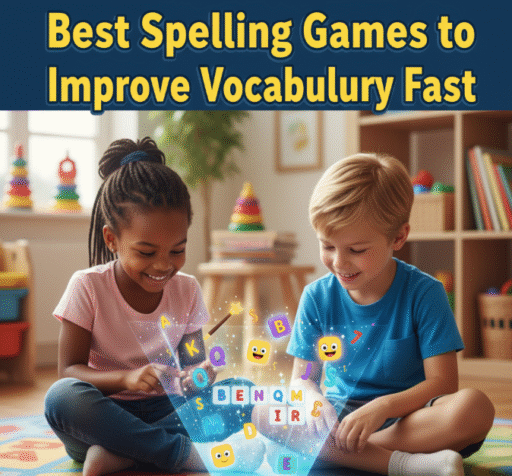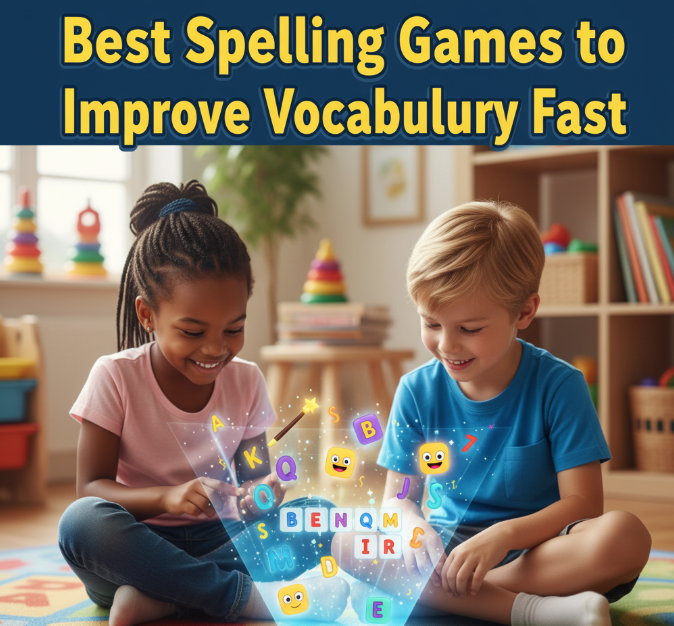Spelling doesn’t have to be boring. With the right games, practice becomes play — and play builds real skill. This article gives you a complete, easy-to-follow guide to the best spelling games that help students learn new words, remember spelling patterns, and grow vocabulary quickly. Everything below is written so an 8th- or 9th-grade student can follow it, with clear examples, game rules, and a practical plan to get better fast.
Why spelling games work (short and simple)
-
They make practice active, not passive.
-
They use repetition in fun ways, which helps memory.
-
They combine reading, listening, and writing — the three ways we learn words.
-
Games create small challenges that push learners just beyond what they already know.
How to use this article
-
Try 2–3 games from different sections each week.
-
Mix digital apps with offline, hands-on games.
-
Use the simple 4-week plan near the end to see fast improvement.
Best classroom and home spelling games
Below are classic and fresh games you can play with one person or a group.
1) Letter Ladder (solo or group)
Goal: Build words by changing one letter at a time.
How to play:
-
Start with a short word (e.g., CAT).
-
Change one letter to make a new valid word (e.g., CAT → COT → DOT → DOG).
-
Continue until you reach the target word (e.g., CAT to DOG).
Why it helps: Teaches letter patterns and phonics. Breaks words into small, predictable steps.
Variations: Time the ladder for speed. Ask players to say the meaning of each new word.
2) Word Treasure Hunt (group, active)
Goal: Find hidden word cards and spell them correctly.
How to play:
-
Hide index cards around a room or yard. Each card has a scrambled word or a simple clue.
-
Players find cards and bring them to a “spell station.”
-
If they spell the word correctly, they keep the card. Highest count wins.
Why it helps: Physical activity + word recall improves memory and engagement.
Variation: Use theme sets (science words, food words, holiday words) to build domain vocabulary.
3) Spell-Bee Relay (group, competitive)
Goal: A team race to spell words perfectly under pressure.
How to play:
-
Split into teams. Place paper and pens at a station.
-
A teacher or host gives each team a word.
-
One player runs to the station, spells the word, returns, tags next player.
-
If wrong, the player must try again until correct.
Why it helps: Builds accuracy under stress and encourages teamwork.
4) Jumble Jam (board-style)
Goal: Unscramble letters to make words and score points.
How to play:
-
Give players a jumbled set of letters (e.g., R E T A C).
-
Players write as many valid words as they can from the letters in 90 seconds.
-
Longer words get more points.
Why it helps: Encourages quick recognition of letter patterns and word roots.
5) Silent Spelling (listening-based)
Goal: Spell words using only gestures or written symbols without speaking them.
How to play:
-
One student thinks of a word and gestures or writes a code for each letter.
-
Other students decode and write the word.
-
Points for speed and accuracy.
Why it helps: Encourages mental mapping between sounds and letters, and visual memory.
Best digital spelling games and apps
Using apps helps with adaptive practice and immediate feedback. Many apps include levels, voice prompts, and rewards. Here are categories and examples you can try:
Spelling apps that teach phonics and patterns
-
Use apps that pronounce words and break them into sounds.
-
Good for early spellers and those who struggle with letter-sound mapping.
Word-building puzzle apps
-
Drag-and-drop letters to form words, complete crosswords, or solve word mazes.
-
Great for speed and pattern recognition.
Competitive multiplayer apps
-
Play real players online in short spelling duels.
-
Helps with pressure and recall.
Tip: Choose apps that offer adjustable difficulty and real progress tracking.
How to pick the right games for different learners
Not every student learns the same way. Match games to learning styles:
-
Visual learners: Jumble Jam, word maps, flashcards with pictures.
-
Auditory learners: Silent Spelling (spoken clues), spelling apps with voice, read-aloud games.
-
Kinesthetic learners: Word Treasure Hunt, Spell-Bee Relay, letter tiles on floor.
-
Independent learners: Letter Ladder, solo app practice, spelling journals.
Short games you can do in 5 minutes
-
Flash Fix: Show a flashcard for 3 seconds, hide it, ask to spell.
-
Pop Quiz Toss: Toss a ball; the catcher spells a given word.
-
One-Minute Make: How many words from “STRANGE” in 60 seconds?
-
Two-Tone: Say a word with one wrong letter. Player identifies and corrects it.
Games that build vocabulary (not just spelling)
Spelling matters — but vocabulary gives meaning. These games combine both.
1) Definition Dash
How to play:
-
Give a definition. Players write the best word that fits and spell it.
-
Points for correct spelling and best match.
Why it helps: Ties meaning to spelling, so words stick.
2) Synonym Swap
How to play:
-
Give a word. Players list synonyms and spell them correctly.
-
Add bonus points for using synonyms in a sentence.
Why it helps: Expands meaning and spelling simultaneously.
3) Word Story Chain
How to play:
-
One player starts a story with a sentence containing a target word.
-
Next player continues with a sentence using another target word.
-
All used words must be spelled correctly.
Why it helps: Teaches usage and context, which improves recall.
Tools and simple resources
| Resource Type | What it helps with | Example use |
|---|---|---|
| Index cards | Quick word sets | Make them for weekly spelling lists |
| Letter tiles | Hands-on building | Create multisyllable words physically |
| Whiteboard | Group play | Fast corrections and rewrites |
| Apps | Adaptive practice | 5–10 minutes daily drills |
| Audio recorder | Pronunciation training | Record words, play back and spell |
Sample weekly practice plan to see fast improvement
Follow this 4-week plan. Commit 20–30 minutes, 4 days a week. Mix games.
Week 1 — Foundation
-
Day 1: Phonics app practice (10 min) + Letter Ladder (10 min)
-
Day 2: Jumble Jam (15 min) + Flash Fix (5 min)
-
Day 3: Word Treasure Hunt or silent reading with spelling out loud (20 min)
-
Day 4: Review tricky words (write each 5 times + say aloud)
Week 2 — Speed and recall
-
Day 1: One-minute Make + app timed drills
-
Day 2: Spell-Bee Relay with family or friends
-
Day 3: Definition Dash (target 10 new words)
-
Day 4: Spelling test and error review
Week 3 — Context and meaning
-
Day 1: Word Story Chain (use new words in sentences)
-
Day 2: Synonym Swap (learn 8 synonyms total)
-
Day 3: Jumble Jam with longer letter sets
-
Day 4: Create flashcards and test
Week 4 — Mix & master
-
Day 1: Competitive app or multiplayer spelling duel
-
Day 2: Full review test (use a mixed word list)
-
Day 3: Write a short essay using 15 learned words
-
Day 4: Celebrate progress + plan next month
Measuring progress: a simple chart
Track weekly tests to see gains. Below is an example chart you can copy and use.
| Week | Test Words | Correct | Accuracy (%) |
|---|---|---|---|
| 1 | 20 | 12 | 60% |
| 2 | 20 | 15 | 75% |
| 3 | 20 | 17 | 85% |
| 4 | 20 | 19 | 95% |
Quick tip: If accuracy is stuck below 70% after two weeks, slow down. Focus on patterns (prefixes, suffixes, common roots).
Common spelling patterns to focus on (easy list)
-
Silent letters: knife, knight, island
-
Double letters: little, address, coffee
-
Vowel teams: ea, ai, oa (read, rain, boat)
-
Prefixes/suffixes: un-, re-, -tion, -able (unhappy, reaction, enjoyable)
-
Homophones (same sound, different spelling): there/their/they’re
Practice games that isolate these patterns. For example, make a “silent letter round” in Jumble Jam.
Spelling mistakes that are easy to fix (and how)
-
Mixing -ible and -able
-
Trick: If the root stands alone as a word, use -able (comfort → comfortable). Otherwise, try -ible.
-
-
Confusing ‘ei’ vs ‘ie’
-
Rule (handy): “i before e except after c, or when sounding like ay as in neighbor and weigh.” Not perfect, but helps.
-
-
Silent letters
-
Fix: Practice by pronouncing slowly and writing letters you don’t hear (knead, gnome).
-
-
Dropping doubled consonants
-
Fix: Check base verb: begin → beginning (double the final consonant when adding -ing if one vowel before it).

Best Spelling Games to Improve Vocabulary Fast
-
Games for fast vocabulary growth (15–30 minutes each)
1) Word Chain with Definitions
-
Build a chain of connected words and define each.
2) Picture Match
-
Match pictures to words and spell them.
3) Root Detective
-
Find words sharing the same root (tele-: telephone, teleport).
4) Fastest Sentence
-
Make the longest correct sentence using 5 new words in 5 minutes.
Spelling drills that don’t feel like drills
-
Word of the Day Jar: Draw one and use it in a chat, journal, or video.
-
Comic Strip Words: Make a 4-panel comic using new vocabulary.
-
Voice Note Spell: Record yourself saying the word, then play and spell without looking.
Parent and teacher tips
-
Give immediate, gentle feedback. Correct but don’t shame.
-
Reward progress with small tokens — a sticker, a star, or extra playtime.
-
Keep word lists short and focused — 8–12 words is perfect.
-
Repeat old words in later weeks for spaced repetition.
-
Encourage reading — games are great, but reading provides most new words.
Printable spelling practice template (copy and use)
Word: __________
Meaning: __________
Use in a sentence: __________
Spell it three times: 1) ______ 2) ______ 3) ______
Related word: __________
Sample 10-word list for quick practice
-
planet
-
sudden
-
muffled
-
bicycle
-
curtain
-
kitchen
-
fantasy
-
exclaim
-
curious
-
invisible
Use this list for Letter Ladder, Jumble Jam, and Flash Fix.
Quick classroom contest idea (1 class period)
Game name: Spell Sprint
Materials: Projector or whiteboard, timer, word list.
Play: Two teams. One student from each team races to write the spelling on the board after the teacher says the word. Correct answers get points. Rotate players. End with a vocabulary challenge: use two words in the same sentence.
Frequently asked questions
Q: How often should I play these games?
A: 15–30 minutes, 3–5 times a week gives visible improvement in 3–4 weeks.
Q: Will games help with tests?
A: Yes — games that focus on recall, spelling rules, and use in sentences translate to better test performance.
Q: Can adults use these games too?
A: Absolutely. The basic memory and pattern techniques work for all ages.
Final checklist to improve vocabulary fast
-
Mix reading with games daily.
-
Target problem patterns first.
-
Use apps for quick daily drills.
-
Keep practice short, frequent, and fun.
-
Track progress weekly and adjust difficulty.
-
Use words in writing and speaking — context locks them in.
Conclusion: Play your way to better spelling
Spelling and vocabulary are not fixed traits — they grow with practice. Games let you practice the right way: active, varied, and enjoyable. Use the games above, follow the 4-week plan, and keep the focus on meaning as well as letters. In just a few weeks you’ll notice clearer writing, stronger reading, and faster recall. Start today: pick two games, set a short goal (10 new words this week), and make learning a little playful every day.




